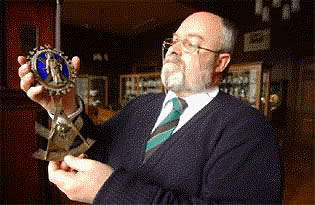
THOUSANDS of documents and artifacts looted from Scottish Masonic Lodges in Europe by the Nazis are to be returned to their rightful owners.
The Russian government has delivered 750 crates full of precious objects such as hand-embroidered aprons, medals and wall hangings to the French Masonic headquarters in Paris.
The goods were plundered from European lodges during the Nazis’ brutal persecution of the secret order, which saw more than 80,000 people sent to concentration camps.
It is thought significant amounts of the material, which languished in Berlin until it was taken by the Russians after the war, belongs to lodges set up by Scots in the 18th century and could be returned to Scotland.
Robert Cooper, curator of the Grand Lodge of Scotland Museum and Library in Edinburgh, is helping to co-ordinate the return of the archives. He said: "For Freemasons in Scotland, as well as historians, this new development is very exciting. Perhaps we will see artifacts that we presumed had been destroyed over the years."
He added: "The systematic persecution of Freemasons was terrible. Hopefully this will bring Masons together - and help them come to terms with the atrocities that happened during the war.
"Ironically it is because the Germans and Russians kept safe what they took from the Lodges that we have a chance of piecing parts of history back together today."
It is hoped Scotland will receive artifacts such as oil paintings and coins used as props during Masonic rituals and medals awarded to members as they progress up the Masonic ranks.
Robert Cooper even hopes that letters exchanged between lodges in France and Scotland might throw up interesting evidence to support a theory that Bonnie Prince Charlie was a Freemason.
"Obviously we don’t know at this time, but there is a theory that he used Masonic Lodges to plan the 1745 invasion of Britain and we are hoping that there might be some letters to prove this. Of course we could all be horribly disappointed."
Scots played a crucial part in the founding of lodges on the continent.
The Grand Lodge of Scotland was formed in Edinburgh in 1736, and within a few short years members were travelling across Europe setting up their own branches. One of the earliest was set up in Montpellier, in France, in 1750.
By the beginning of the 20th century there were around 50 Scottish Masonic Lodges scattered across the continent.
The lodges kept close touch with masons back home in Scotland until the dark days of the Second World War, when the Nazis rounded up free-masons and sent them to concentration camps alongside Jews and Gypsies.
Lodges were raided and membership lists, letters and documents were taken and used to track down and persecute other Freemasons.
Artifacts such as paintings, glasses and elaborate costumes and props such as gold coins used in Masonic ceremonies, were shipped to a central holding vault in Berlin.
Despite their hatred of the secret society, for some reason the Nazis did not destroy the material. After the war the vaults were broken into and their contents shipped to Moscow by the Russians.
Hundreds of boxes of the stolen Masonic artifacts were stacked in vaults in the centre of Moscow while documents were kept at the Russian Military Archives in Moscow - and there they were left, and forgotten about, for almost 60 years.
However, 10 years ago, an American researcher working in Moscow discovered the Masonic archives and treasures and wrote an essay on the subject.
And last year the Russian government agreed to return much of what was taken.
It is part of a wider move to return goods stolen during the Second World War to their rightful owners.
More than 750 boxes were shipped to the Grand Orient of France, the Paris-based headquarters of the French Freemasonry, earlier this year.
The cases have still to be unpacked.
Pierre Mollier, from the Grand Orient of France, who is co-ordinating the operation from Paris, said: "We really don’t know what we are going to find because it’s in the very early stages.
"The point is this stuff has been plundered from Lodges in the Second World War and it is now being returned to us."
John MacMillan, professor of 19th and 20th century French history at Edinburgh University, said he thought documents and artifacts returned could shed light on historic events.
"This is very significant indeed, and the Freemasons of late have been much more open to let people see their documentation to try to prove they have nothing to hide.
"What is being sent over is of value - important historic value - which could shed light on past events."
He added: "I only hope the masons are not disappointed, and that conspiracy theories are not shattered."
Evert Kwaadgras, the curator at the Freemasons’ headquarters in Holland, played a crucial part in persuading the Russians to return the artifacts.
He first heard about the archives a decade ago. "I have friends in places," he said, "and about 10 years ago I got a call from a friend saying I would be very interested in what she had just discovered.
"An essay had been written by an American researcher about this, so we thought it was something worth looking into."
He said he took a trip to Moscow, to visit the Russian Military State Archive where most of the documentation is stored.
"Then I contacted all my counterparts around Europe and told them that the Russians had a collection of information and artifacts that they would be very interested in."
Kwaadgras said that it had taken 10 years of intensive negotiations with the Russian authorities to get the plundered Masonic documents returned.
"It has been a long diplomatic exercise," he added. "But it is rewarding to know that they are returning what is rightfully ours."
© Scotland on Sunday
23rd June 2002
